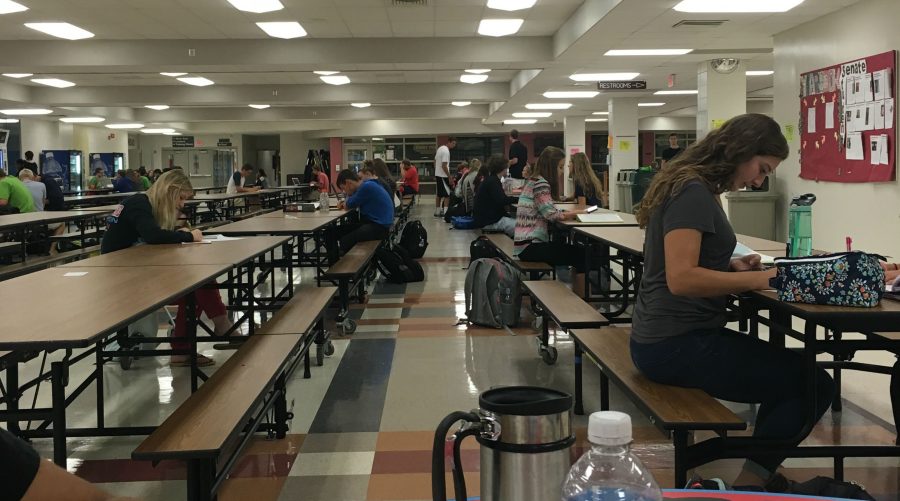ProcrastiNATION
Roman philosopher, Cicero, said, “In the conduct of almost every affair slowness and procrastination are hateful.”
Bill Wilson, the founder of Alcoholics Anonymous, wrote procrastination “is really sloth in five syllables.”
According to slate.com’s “Pro-cras-ti-na-tion” written by Ben Zimmer, procrastination isn’t only postponement it is intentional avoidance. The latin verb procrastinus, pro meaning “forward” and crastinus meaning “of tomorrow,” literally meaning pushing tasks off until tomorrow, which quickly becomes cyclical.
Although procrastination goes back centuries, it’s uprise is attributed to the rise of the capitalist era.
Procrastination is a result of poor time management and the failure to self regulate, according to Eric Jaffe in “Why Wait? The Science Behind Procrastination.” Studies have shown that procrastination leads to higher levels of stress and lower levels of success.
People who wait until last minute to file their taxes, on average lose $400 and report high levels of anxiety. According to brandongaille.com, 40% of people have experienced financial loss thanks to procrastinating. University of Calgary Psych professor, Piers Steel, says “US gross national product would probably rise by $50 billion if email alerts would suddenly disappear.”
There are two types of procrastinators, chronic and situational. Chronic procrastinators put off tasks on a daily basis, whether it be scheduling appointments, school work, exercise, etc. It becomes second nature to push tasks off. The search for distractions and often use the excuse that they work better under pressure. According to brandongaille.com, in 1978 only 5% of individuals identified as a chronic procrastinator, today 26% of people admit to being chronic procrastinators.
Joseph Ferrari, Ph. D, Psychology professor at the University of Calgary says, “The chronic procrastinator, the person who does this as a lifestyle, would rather have other people think that they lack effort than lacking ability. It’s a maladaptive lifestyle.”
Situational procrastinators only procrastinate on unwanted tasks, everyone is guilty of this at times.
Procrastination is a battle between the limbic system and the prefrontal cortex. The limbic system is often referred to as the pleasure center of the brain. The prefrontal cortex is the planner. Timothy A. Pychyl, Ph.D., a psychology professor at Carleton University, says it guides you for “immediate mood repair.” The prefrontal cortex allows humans to process information and make decisions. Unlike the limbic system which is automatic, we must engage our prefrontal or else we will resort back to what is easiest and makes us the happiest.
Brandongaille.com states 85% to 95% of students claim to have problems associated with procrastination. Fifty seven percent of Dakota State University students claim to feel a mix of enjoying the rush and feeling stressed. 43% of students say it is second nature to procrastinate and 60% say they procrastinate on papers more than any other assignments.
According to an article by Rebecca Klein for the Huffington Post, “Here’s What Procrastinators Are Doing Instead of Schoolwork,” 1,300 students were surveyed to find out how they were wasting their time. In high school students 62% spend their time watching TV or movies, 63% on social media, 40% sleeping, 41% texting, 23% with friends or significant other, 34% gaming, 24% reading, and 8% shopping. College students spend 60% watching TV or movies, 53% on social media, 52% sleeping, 31% texting, 37% with friends or significant other, 23% gaming, 18% reading, and 9% shopping.
According to realsimple.com, “How to Stop Procrastinating” by Amy Spencer, there are certain things one can do to increase productivity and minimize procrastination. Spencer advises starting with the most difficult or worst things first.
Steel says, “We have a limited, depletable supply of will power and resources.” All other tasks suffer if you’re stressed about the worst.
Spencer refers to the next step as the “2 pm reboot.” You should assess and alter plan in order to complete as much as possible. It is still early enough to get a fair amount of work done. Thirdly, make the job smaller.
Ferrari says feeling overwhelmed is like, “seeing a forest and forgetting that it’s made of trees. He advises, “Cut down one tree. And if you can’t cut the whole tree, cut branches.” In summary, one step at a time.
Spencer also says creating an audience for yourself creates positive pressure and the fear of letting someone other than yourself down will encourage you to work. Another thing one can do is time yourself, race the clock because even if you don’t win you will be more likely to continue because of the satisfaction of completing a task. Block time wasters. This includes muting your phone, email, and turning off our beloved Netflix. And lastly have a day where you attempt to get as much work done as possible. The rest of the week will be significantly less stressful and allow you to do other, more enjoyable, things.
Tony Yellick says, “Certain music relaxes me and encourages me to work.”
Arrowhead Senior Kenzie O’Shea says, “I hate being overwhelmed when it’s too late. I’d rather finish all my work right when I get it so I can relax and focus on other things.”
